- Home
- Nevil Shute
Complete Works of Nevil Shute Page 12
Complete Works of Nevil Shute Read online
Page 12
I saw him smile at me in the moonlight. “They have two hundred horse-power in them,” he said gently. “I told you I saw them at Genoa. They use them for running the stuff ashore to America from beyond the twelve-mile limit.”
I stared at him blankly. “You mean this is Mattani?”
He straightened himself up and gazed out in the direction of the rumble, much louder now and evidently coming over the still water through Marazan. I heard the note change as they throttled down.
“I’m so sorry about this,” he said simply. “I didn’t think it would come down to violence.”
I hadn’t anything to say to that, but stood watching the Sound and the ridge of rocks between Pendruan and the tall rock under White Island that they call the Crab Pot. Compton sat down in the cockpit and began to fit a clip into a Colt automatic pistol that he had produced from his pocket. I looked at this thing incredulously.
“Do you really think it’s necessary?” I inquired.
He looked up at me, quiet and reflective. “Roddy was always a bit queer,” he said at last. “Always dashing off and doing things that he’d be sorry for afterwards.”
I saw the launch for the first time then, crossing a moonlit patch of sea about a quarter of a mile away. I couldn’t see very well what she was like; she was black against the moonlit water, and I could only say that she was a very large launch, one of the largest I had ever seen. I lost sight of her in a moment; we watched for her to reappear, but she came creeping along under the shadow of White Island so that we could not distinguish her against the land. Then we heard the engines reverse with a thrashing from her propellers; finally they stopped altogether. She was quite invisible, but I judged that she was lying in the shadow close under the Crab Pot.
There was silence for a little, and then somebody hailed us. The night was so still that though they must have been two hundred yards away, it was hardly necessary for the stranger to raise his voice.
“Ho — ah, the yacht!” he cried. At the first hail I knew that he wasn’t English. The cry echoed round and died into the stillness. “Ho — ah, the yacht!”
I answered. “Launch ahoy. What launch is that?”
There was a pause. I fancied that I could hear them consulting one another in low tones; in my mind’s eye I could see them. Then the same man hailed again.
“Ho — ah, the yacht! It is for Meester Compton. It is to Meester Compton that I have a message from his brother. It is allowed that I come alongside?”
“No, it ruddy well isn’t,” I cried. “Keep off.”
Compton touched me on the arm. “They’ll come if they want to,” he said. “We can only keep them off by taking potshots at them, I’m afraid. I know these lads.”
There was another hail from the launch. “It is necessary that we come alongside.”
I turned to Compton. “Shall I say you’re in St. Mary’s?”
“They’d come alongside just the same, to see.” He stood up in the cockpit and hailed. “Hullo. This is Compton speaking. Keep away, and shout out your message.”
He drew the pistol from his pocket and laid it on the hatch at the head of the companion. There was another little silence, and then:
“It is more convenient that we come alongside.”
“No, it isn’t,” I cried. “Keep off.”
Our visitor seemed to resign himself to the inevitable.
“Very well. Meester Compton, I have a message to give to you from your brother. I am to say to you, to come to Italy, to Napoli. As he has told to you. I am to say to you to come in the manner of his guest, and to remind you that he will offer you the post of which he spoke to you. I am to beg of you to come.”
His voice died away over the stillness of the Sound. Compton roused himself and turned to me. “Pressing, isn’t it?” he said. He called across the water:
“What happens if I won’t go with you?”
“Meester Compton, I am to beg of you to come.”
“I dare say. I’m not coming.”
There was a long pause then. I could imagine them crouched together in the darkness in the stern of the launch behind the engine, talking quickly together in low tones, perhaps making their preparations for what was now inevitable. Compton was staring out into the darkness beneath the Crab Pot; I stretched out my hand quietly and took his pistol from the hatch.
They hailed again. “Meester Compton, I must beg of you to be wise. I have orders that you should come with me.”
“Now we’re getting down to it,” said Compton quietly. He raised his voice:
“I’m not coming. What are you going to do about it?”
“Meester Compton. It will be better for all if you will come by your own will.”
Suddenly they started up their engine. She fired with a roar, and steadied into a low continuous rumble.
“See here,” I cried. The instant I spoke they stopped the engine again, I suppose to hear more distinctly. “I don’t know who you are in the launch. But you must keep away from here. You can go on down White Sound, or you can go back the way you came. If you come any closer to this vessel I shall open fire on you.”
There was a long silence, but when the reply came it was brief and to the point. I saw the flash from the darkness low down upon the water, and at the same moment the bullet whipped over our heads and splashed into the folds of the main. What struck me afterwards when we were huddled down on the floor of the cockpit and peering over the coaming was that the report had been so slight. It struck me that they must be using a silencer on the rifle. I remember telling Compton that I’d like to get hold of that rifle and have a look at it.
I cocked the automatic. “How many rounds have we got for this thing?” I asked.
He had two spare clips, about twenty rounds in all. I looked at my watch; it was a quarter past two. There were still two clear hours till dawn. One point was in our favour, I thought; our little cannon would make more row than forty of theirs put together. With any luck somebody would hear and come to see what it was all about — though I had to admit that the chance was pretty small.
I took a careful aim at the spot where I had seen the flash, and fired. Before the echo had died away we were lying flat on top of each other in the cockpit, listening to the bullets whipping over us or slapping into the topsides. I noticed something that put the wind up me properly. One of the bullets hit the boom above our heads and wrenched a great hunk out of it as big as my two fists, instead of penetrating. The sight gave me a nasty turn; I was on the point of calling Compton’s attention to it, but thought better of it. It wouldn’t do him any good, I thought, to know that they were shooting at us with soft-nosed bullets.
Presently the firing died away. I reckoned that they had hit us ten or a dozen times, mostly in the topsides. Neither Compton nor I were touched; the bullets did not seem to have the penetrating power to come through the cockpit. I couldn’t see what sort of a mess they were making of the hull, but I remember thinking that I should have to sell out my Imperial Tobaccos to buy the vessel after this was over — always supposing she was still afloat and I were capable of instructing a broker in any more conventional manner than by planchette.
I stuck my head up over the coaming and fired again. They replied at their leisure with two that came unpleasantly close. I didn’t fire any more because I could see nothing to fire at, and for a long time there was silence. We could hear nothing from the launch.
“End of Part One,” said Compton bitterly. “Part Two will follow immediately. I say, Stenning, I’m most frightfully sorry to have dragged you into this. I never thought that Roddy would go flying off the deep end in this way.”
We waited for some time, and presently he sat up. “They seem to have a complex that I should go with them to Italy,” he said thoughtfully. “It looks like one of those complexes that are dangerous to repress....”
He raised himself in the cockpit to hail the Italians. I took him by the shoulders and pressed him down again.
&nb
sp; “No, you don’t,” I said. “You’ll be cold meat ten minutes after you get aboard that launch.”
In the dim light he looked at me wonderingly. “I don’t think Roddy would do a thing like that,” he said at last.
I laughed shortly, “I do,” I said. “When they’d done with you they’d come back and polish off me. I reckon we’re better where we are.”
The vessel was lying about broadside on to the launch. “I don’t see why we shouldn’t slip over the side and swim ashore,” I said. “I believe we could do it in this light without being spotted. Can you swim quietly?”
He nodded. “Would we be much better off on Pendruan?” he said. “There’s not much cover there.”
“There’s a cottage somewhere on Pendruan,” I said. “In any case, we’d be farther away from those lads in the launch for the moment. That strikes me as a considerable advantage. I don’t think they’re quite nice to know.”
It looked feasible enough. True, the vessel was lying in bright moonlight, and I had no doubt that they were watching us intently from the shadow. At the same time, I thought it could be done. They were a good two hundred yards away. One would have to move very slowly while one was exposed to view; a quick movement would be seen at once. I thought it would be possible to crawl very slowly over the coaming of the cockpit and to slip into the water silently on the far side of the vessel. Once in the water we should have to swim quietly to Pendruan, taking care to keep the vessel between ourselves and the launch. I didn’t like this long silence. It seemed to me that they were up to some mischief on board the launch, and the sooner we were out of the Irene the better.
I took off my shoes and began to raise myself very slowly above the coaming by the upstanding hatchway. I don’t know how long it was before I was lying face downwards on the deck — perhaps ten minutes in all. I only know that every muscle in my body was aching with the strain of holding intolerable positions as I climbed out of the cockpit, for fear of moving too quickly. On deck I was able to relax, and I lay face downwards for a little, resting myself before tackling the next effort of getting noiselessly down the curving side of the vessel into the water.
“Listen....” muttered Compton.
And then, as I lay resting on the deck, I first heard the motor-boat very faintly in the distance. I think she was on the far side of Pendruan then, because it was fully a quarter of an hour before she came round the point into the entrance to White Sound.
From the first it never occurred to us to doubt that she was on our side; that is, that she contained the police, the friendly, tolerant police. It could be nobody else. We lay and listened with the most intense relief to the steady thumping of the little single-cylinder engine, growing gradually louder as she approached the entrance. They must have heard it on the launch too, but there was no sound or sign from her. Apparently they were going to stay and see it out.
“I wonder if this is the end of Roddy,” muttered Compton. “They’re bound to see the launch.”
For my part, I was never so glad to see my sins come home to roost as I was then.
“I suppose this is the end of it,” I said. “I can’t say I shall be sorry to be arrested. I wonder if we’ll be able to persuade them to go and have a look at the Dagoes.”
Compton shook his head. “They’ll be gone by the time this little boat gets here,” he said. “They’ll slip out back through Marazan, the way they came.”
But they didn’t go. The puttering of the little engine grew clearer and clearer; even before I saw her I knew that she was the same little motor-boat that had brought Joan Stevenson and, later, Compton to Pendruan. The noise of her little engine dominated the situation. Long before she came in sight I was sitting upright upon the deck looking towards the entrance to White Sound for her appearance, a position that would have brought a dozen shots whistling about my ears ten minutes before.
She rounded the point at last and set a course straight for us. She carried a lantern in the bows and for a time this blinded us and prevented us from seeing by the moonlight how many men she had aboard. She came on straight down the middle of the sound, leaving a silvery trail behind her that spread till it lapped quietly upon the beaches on the Pendruan side. The Sound was as calm as that. I have often wondered what they thought of her on board the launch, how nearly they may have come to firing on her. She must have had a narrow escape, I think. I can only suppose that they knew what she was, and hoped to slip away unseen when she had departed with her prisoners.
Two or three hundred yards astern of us she altered course, and came up between us and Pendruan beach; I suppose, to put herself between us and the Pendruan shore in case we tried to swim for it. We could see then that she had four men aboard; the lantern glistened on a black oilskin that one of them was wearing who was seated in the bows, so that I judged them to be coastguards or lighthouse keepers enrolled for the occasion as guardians of the law. The boat came up between us and the land at a distance of perhaps fifty yards; in dealing with the motor-boat we had to turn our backs on the launch. I didn’t like that much, and resolved to keep an eye open in the direction of the Crab Pot.
They stopped their engine a little way astern of us, and the boat gradually lost way upon the water. I hailed them then, thinking it would be best to take what little advantage there was to be gained by assuming the offensive.
“Boat ahoy,” I cried. “What boat’s that?”
In the stern of the motor-boat a man stood up and coughed. “Is that the yacht Irene, of Salcombe?” he said.
“This is the Irene,” I replied.
“Quite so. I’m afraid I must ask you to allow me to come aboard, sir. I am a police officer. I have a warrant here for the arrest of Philip Stenning, and instructions to arrest Denis Compton at sight.”
“You’d better come alongside, officer,” I said. “I’m Stenning.”
They put out an oar and sculled her alongside. I watched the Crab Pot closely as they were doing this, but could detect no sign of life or movement from the shadow. They were playing a waiting game. One can see that clearly now.
The motor-boat bumped gently against the side. Standing in the cockpit of the Irene I was about on a level with the inspector standing in the boat. I leaned over the deck towards him.
“One moment officer,” I said. “My name is Philip Stenning. This is Compton. We’re giving ourselves up. Come aboard if you like, but be careful. There’s a launch full of men in the shadow of those rocks — over there, just under the island. They came to kidnap Mr Compton. We’ve been firing at them, and they at us. Come aboard, but be careful.”
He clambered heavily into the cockpit and turned to me at once. One of the sailors followed him.
“Captain Philip Stenning, of Claremont, Simonstown Road, Maida Vale, London.”
“That’s me,” I said.
“I have a warrant for your arrest under the Air Navigation Acts. I must ask you to come with me, sir.”
I blinked at him. “Under what?” I said.
“The Air Navigation Acts,” he replied imperturbably. “The warrant is issued in respect of offences arising out of an aeroplane accident at Stokenchurch on the 6th instant.”
“Good God!” I said weakly. That was how they got me. They had been unable to establish anything definite against me; they had such a strong case of suspicion, though, that they had raked up a string of technical offences connected with the crash upon which to issue a warrant. It seemed that I hadn’t written up the log-book for the machine for three days. It seemed that I had “committed material hurt or damage in landing” and had gone away without paying the farmer for digging a hole in his field with the machine. However, I have always held that the end justifies the means and I’ve never managed to feel as much aggrieved over this proceeding as I should like to. Indeed, at the time it struck me as damn funny.
“All right, officer,” I said, “I’ll come quietly.”
He turned to Compton and produced a sheaf of papers from his pock
et. For a moment he stood trying to sort them out in the dim light from the lantern in the bows of the motor-boat. Then he turned to one of the men. “Pass me that lantern,” he said.
I interposed. “One moment,” I said. “Be careful of that lantern. There’s a boat over there in the shadows. Don’t show too much light about. Let’s get down into the saloon.”
“Boat?” he said. “What boat?”
I could have cursed his thick head, and did so under my breath. “The boat I was telling you about,” I replied. “She’s lying over there in the shadow under the rocks. They’ve been firing at us.”
One of the men spoke up. “I said I heard shots fired,” he remarked. “Didn’t I?”
The inspector turned his head and looked over the Sound to the shadows beneath the Crab Pot. I think he must have thought that this was some trick of ours, some device to throw him off his guard and to prevent him examining Compton. At any rate, he turned back abruptly.
“I don’t see any boat,” he said. “We’ll deal with the boat afterwards.”
He reached down to the motor-boat, took the lantern, and raised it above his head as he leaned forward to compare Compton with the photograph upon his papers. Compton grinned at him in the strong light from the lantern; I think he was going to say something funny. I like to think he was.
I glanced nervously towards the shadows across the water. I distinctly saw the two spurts of flame as they fired; there were two of them and they fired practically simultaneously. We learned later that their orders were explicit. They fired together. One of the shots missed and whipped through somewhere between us; the other went home with a sound that I wish I could forget.
For a moment I didn’t see who it was that was hit. And then I saw that it was Compton that they’d got, as they had meant to all along. He was standing there quite motionless, a little bent over the tiller, gripping the coaming of the cockpit with one hand.
The inspector was still holding the lantern aloft. I pushed past him with an oath; as I jumped aft there was a roar from the shadows as they started up the engine in the launch.

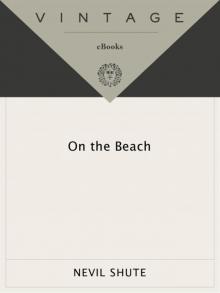 On the Beach
On the Beach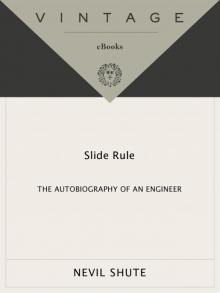 Slide Rule
Slide Rule A Town Like Alice
A Town Like Alice The Far Country
The Far Country Pied Piper
Pied Piper Round the Bend
Round the Bend An Old Captivity
An Old Captivity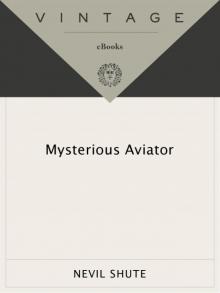 Mysterious Aviator
Mysterious Aviator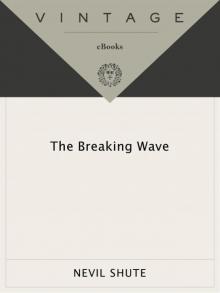 The Breaking Wave
The Breaking Wave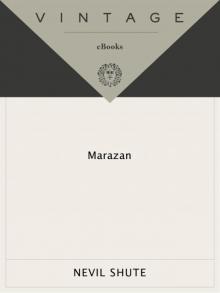 Marazan
Marazan Lonely Road
Lonely Road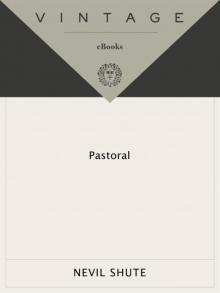 Pastoral
Pastoral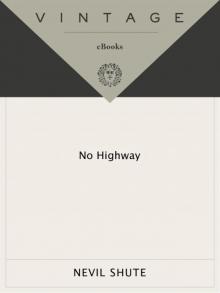 No Highway
No Highway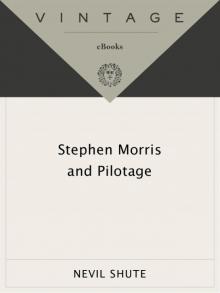 Stephen Morris and Pilotage
Stephen Morris and Pilotage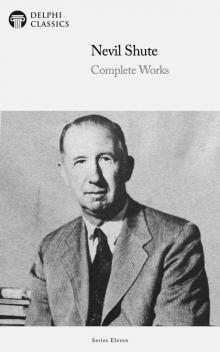 Complete Works of Nevil Shute
Complete Works of Nevil Shute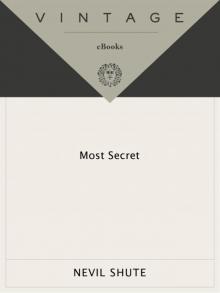 Most Secret
Most Secret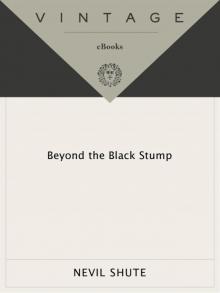 Beyond the Black Stump
Beyond the Black Stump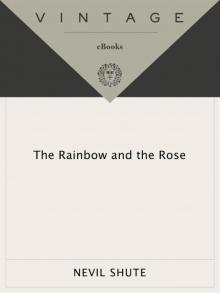 The Rainbow and the Rose
The Rainbow and the Rose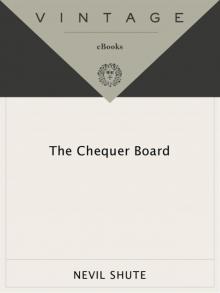 The Chequer Board
The Chequer Board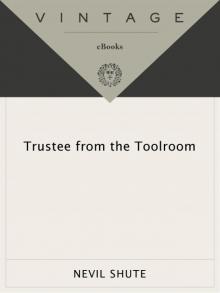 Trustee From the Toolroom
Trustee From the Toolroom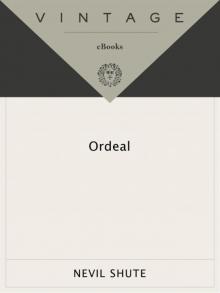 Ordeal
Ordeal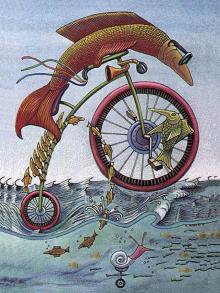 Stephen Morris
Stephen Morris